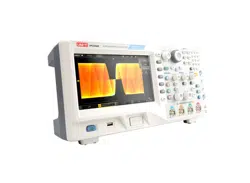Loading ...
Loading ...
Loading ...

16
Chapter 4 Sampling System Settings
Sampling is taking the analog input signal and converts it into discrete points
by using the
analog to digital converter (ADC).
Press the ACQUIRE key to enter the sample menu.
Sample Menu
Functions
Options
Descriptions
Sampling in the normal way
Sampling in peak detection mode
Sampling in high-resolution mode
Sampling in envelope mode
Sampling in an average way
In the average acquisition mode, you
can adjust the Multipurpose knob to
set the average number of times. The
average number of times can be set
to 2n, and n is an integer from 1 to 13.
Set the memory depth to automatic,
which is the normal memory depth
Set the memory depth to 7kpts
Set the memory depth to 70kpts
Set the memory depth to 700kpts
Set the memory depth to 7Mpts
Set the memory depth to 70Mpts
Normal sampling
Peak sampling
High resolution
Envelope
Average
2 ~ 8192
Auto
7k
70k
700k
7M
70M
Acquisition
Mode
Average
Memory
Depth
4.1 Sampling Rate
(1) Sampling and Sampling Rate
Sampling means that the oscilloscope samples the input analog signal,
converts the sample to digital data, and then collects the digital data into
waveform records. Finally, the waveform record is stored in the acquisition
memory.
Analog input signal Sampling points
Sampling rate refers to the time interval between two sampling points. The
maximum sampling rate of the UPO3000E series is 2.5 GS/s.
The sampling rate will be affected by the time base scale and the memory
depth. UPO3000E oscilloscope displays the sampling rate in real time at
the top status bar, user can change the horizontal time base by adjusting
the horizontal SCALE knob or change the memory depth to change the
sampling rate.
(2) Low Sampling Rate Effect
1. Waveform distortion: Due to low sampling rate, the details of the waveform
might be missing, the sampling waveform might be much different from the
actual signal.
Loading ...
Loading ...
Loading ...
